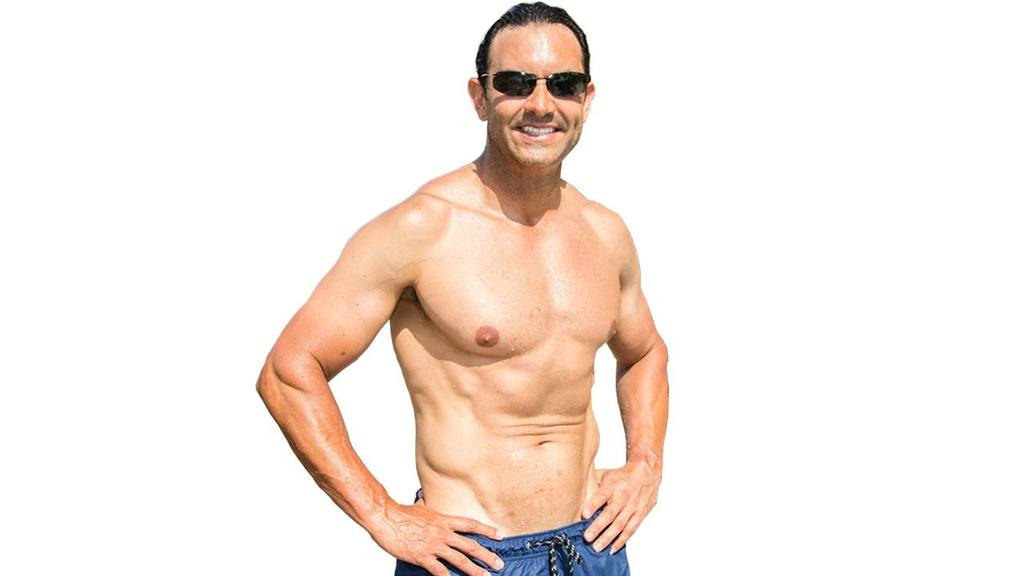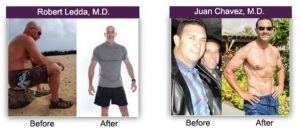
Weight loss has become a priority for a growing portion of the population. According to the CDC, more than a third of U.S. adults are considered obese, while a whopping 70% of adults are considered overweight.[1]
In addition, while many people seek out weight loss programs for aesthetic reasons, the impact of excess body fat extends far beyond appearance alone. Dangers of being overweight include increased risk for developing serious health issues, including Type 2 diabetes, hypertension, cardiovascular disease, fatty liver disease, and even certain types of cancer.[2]
It is, therefore, no surprise that an increasing number of individuals are pursuing weight loss goals to look and feel better. The only problem is that many approaches are built on flawed diets or the belief that exercise routines alone can achieve sustained weight loss. To further complicate the matter, adults in their middle ages and beyond face unique weight loss challenges requiring strategic, tailored solutions. That is where Cenegenics comes in.
Cenegenics is an age management medicine clinic featuring 100% personalized programs to help patients lose weight and keep it off for good. The program takes an all-encompassing approach to wellness and, beyond weight loss, patients also experience boosted energy, improved cognition, and better sleep, among other health improvements. Here, we examine what the Cenegenics weight loss program entails, and why it works so well.


While there is no shortage of weight loss methods popular today, many of them are flawed in a number of ways. At the most basic level, people often pursue dieting without first developing an understanding of the ways in which nutrition impacts overall health. Indeed, nutrition is inherently complex: phytonutrients produce specific yet significantly different effects in the body.
Age management physicians have an in-depth understanding of how phytonutrients impact the body, as well as how their intake can be manipulated for long-term success in spite of slowing metabolisms and other factors affecting older adults. Additionally, these specialists can pinpoint the flaws in previous attempts made to enact dietary changes, including the shortcomings of many popular diet plans.
For one, they often fail to address the precise nutritional and caloric needs of the participating individual. Without an in-depth assessment of one’s health, it is impossible to pinpoint one person’s dietary needs compared to the next. Moreover, many individuals are unaware of how phytonutrients impact weight loss and health in general.
Not all calories are created equal, and in order to succeed with sustainable weight loss, people need foundational knowledge of recommended intake of both key nutrients and portion sizes. They need an outlined plan that eliminates guesswork and takes into consideration the importance of the right phytonutrient mix.
Perhaps most importantly, diets tend to fail because they are viewed as a short-term solution to a problem. Thus, the ways in which we view diets are inherently flawed: dietary changes are often sought out as a quick fix to losing weight, so the eating habits provided by many diets naturally fail to hold long-term value.
According to UCLA research based on analyses of more than 30 long-term studies, the majority of people participating in diets lost five to ten percent of their body weight, only to regain it later. Moreover, one- to two-thirds of people regain more weight than they originally lost within four to five years of dieting.[3]
Long-term compliance and a caloric deficit are the two components every nutrition plan needs for success. The first component is the one with which many subjects struggle. Highly restrictive diets are generally unsustainable over the long term. While there are many different approaches that can be used to achieve weight loss, including high-protein eating plans, the one that will have the best odds of success is the one that the subject can maintain over a long-term basis.
In other words, individuals seeking permanent weight loss must begin to rethink the role of food to make lasting changes. Making healthy choices to promote nourishment based on a person’s lifestyle and preferences is far more effective than the traditional approach to dieting, which is often based on eliminating entire food groups or other restrictions, which make it increasingly difficult to maintain long-term compliance.
We established in the previous section that the majority of weight loss endeavors often result in failure – or worse, added weight gain. What makes Cenegenics different from the rest? According to a recent study, Cenegenics members record an average decrease of 30% in body fat percentage.
How, then, does the program ensure compliance and actually deliver on its promises? Unlike diets, which tend to focus on a single facet of life (changes to eating patterns), the Cenegenics program takes a comprehensive approach to weight loss to achieve lasting lifestyle improvements. Specifically, the robust program encompasses the following key elements:

As mentioned above, nutrition can be a complex and challenging feat – but only if you lack the proper guidance. Cenegenics physicians are specifically trained and certified in age management medicine. They complete specialized training outside of their mandatory schooling and are therefore armed with the competency to administer exceptional care in all realms of age management, including nutrition and hormone regulation.
Unlike other wellness coaches or nutritionists, Cenegenics physicians do not simply provide plans and leave patients to their own devices. They monitor your program medically, based on follow-up lab results and phone conversations. Whether by phone, email or in person, you can always contact your physician to discuss what is working or what may need to be refined based on lifestyle changes.
The Cenegenics team knows that sustainable weight loss is not a “one and done” activity; but instead, it must be continuously revisited to meet the evolving needs of the patient. This level of support cannot be found anywhere else, which is one of the primary reasons why Cenegenics is so vastly different from any other weight loss program.
The Cenegenics program begins with an Elite Health Evaluation to determine your metabolism, endocrine functionality, and overall physiology – all of which contribute to the ways in which your body processes nutrients. Based on these findings, Cenegenics physicians take corrective actions to help your body process at its highest possible level.
Your doctor will recommend a low-glycemic food plan to eliminate or significantly reduce factors leading to increased inflammation, harmful insulin responses, fat production, and other negative impacts on health. Unlike fad diets, Cenegenics food plans are based on scientifically proven results. Not only do the plans promote sustained weight loss and management, but they also minimize the risk of developing serious conditions including cardiovascular disease, Type 2 diabetes, and hypertension.
Another reason traditional dieting falls short is that it overlooks possible hormone imbalances. Hormones, including those that influence metabolisms such as cortisol, human growth hormone (hGH), and thyroid hormone, decline with age. Additionally, hormones such as testosterone impact muscle tone and development, while estrogen can affect digestion. Thus, hormones contribute to weight management in diverse and complex ways.
Following the Elite Health Evaluation, Cenegenics physicians make recommendations based on detected hormone levels. If clinically indicated, hormonal optimization may be encompassed by your treatment to achieve a balanced endocrine system to support a strong foundation for weight loss.

One fallacy permeating today’s perception of weight loss is that one can simply exercise their way to healthy body composition. Again, in order to achieve sustainable weight loss, a caloric deficit is essential. It is far easier to control calorie intake than it is to “out-exercise” poor dietary choices.
Nonetheless, exercise is essential to lasting wellness and permanent weight loss, and it can indeed spur further weight loss in individuals who are already making the right eating choices. Using exercise in combination with certain dietary choices – increasing protein intake, for instance – can have beneficial impacts on people seeking sustained weight loss.
Regular exercise can increase metabolic rates and improve body composition. Moreover, it can also lower heart disease risk. In fact, poor fitness levels are the deadliest risk factor for death among all – including hypertension, diabetes, obesity, heart arrhythmia, high cholesterol, and even smoking.
To support boosted efforts to achieve and maintain a healthy weight, along with a broad range of additional wellness outcomes, the Cenegenics age management program pairs patients with an appointed exercise physiologist to develop a plan fitting their personal lifestyle and health goals. They will balance exercises across three main categories: flexibility, cardiovascular fitness, and resistance/weight training.

In addition to the phytonutrients we obtain through food sources, there are many additional vitamins, minerals, and antioxidants the body needs to support essential functions, including weight management. Some vitamins may even aid directly in weight loss.
For example, in a weight-loss study of postmenopausal women, participants who achieved healthy or replete levels of vitamin D lost more weight than those who did not reach the same levels.[4] It is suspected that more than 40% of the U.S. population is deficient in this critical nutrient alone, which is precisely why Cenegenics physicians perform comprehensive blood work to determine individual deficiencies upon which supplement recommendations are made.[5]
To support better overall wellness, Cenegenics physicians provide a personalized regimen of nutraceutical supplements. As Cenegenics supplements are distributed for clinical use, manufacturing and quality assurance testing is held to higher regulation, surpassing the common standards observed in the retail supplement industry.
From raw material acquisition and manufacturing to capsulation, bottling, and labeling, our facilities and team undergo multiple quality assurance checkpoints during the product development process. Prior to releasing finished nutraceutical products to our physicians and teams, Cenegenics testing confirms the final product meets label claims and passes United States Pharmacopeia testing for biomicroorganisms and heavy metals.
All aspects of manufacturing and product development are completed in our FDA-registered, NSF/NSF for Sports-certified facilities that are also awarded the international Therapeutic Goods Association certification.
The previous section provided a comprehensive overview of the pillars behind Cenegenics’ powerful weight loss program. Here, we will dive deeper into the precise science of how Cenegenics helps patients achieve their weight loss goals.
The highly comprehensive blood testing performed during the first phase of the Cenegenics Elite Health Evaluation yields invaluable insights. It is also performed frequently to measure compliance and program effectiveness. Below are the key insights pertaining to weight loss revealed in the patient’s blood work.
One factor blood work determines is the patient’s insulin sensitivity, including fasting glucose, fasting insulin, hemoglobin A1c levels, and more. These findings will shape the precise dietary recommendations set forth in the patient’s food plan.
Reductions in insulin levels allow fat to be selected as the preferred fuel for the body’s energy supply, and the most direct way to achieve this is through carbohydrate restriction. The patient’s insulin sensitivity will therefore determine carbohydrate selection. For instance, some patients may need to limit carbohydrate intake to only vegetables, while others may benefit from a mix of vegetables, fruit, sweet potatoes, and/or whole grains.
A patient’s blood analysis also reveals their lipid metabolism, or their body’s ability to break down or store fats for energy. Cholesterol levels, including high-density lipoprotein (HDL, or the “good” cholesterol), low-density lipoprotein (LDL, or the “bad” cholesterol), triglycerides, and coronary risk ratios are measured.
These findings will aid in fat selection for the individual and will confirm whether high-intensity exercise is being performed as directed throughout the course of the program. High-intensity interval training (HIIT) increases fat burning due to higher exercise intensity and long-lasting excess post-exercise oxygen consumption (EPOC).
Additionally, blood work results will help physicians provide recommendations for fat intake. Like other phytonutrients, there are different types of fats, some of which have better health properties than others. Another common misconception is that fat intake is directly linked to weight gain.
In reality, excess carbohydrate consumption is the main culprit behind obesity. This falsehood is, in part, why low-fat diets tend to produce poor results. Cenegenics physicians support patients in incorporating healthy fats from whole food sources into their diets, including nuts, avocados, and oils.
Inflammatory markers are strong risk indicators for cardiovascular disease.[6] Blood tests may measure C-reactive protein, among others. These will confirm whether sufficient compliance with food and exercise plans is being achieved or if there are any new issues requiring attention.
Cenegenics physicians perform a complete body composition assessment via dual-energy x-ray absorptiometry (DXA) scan, the most trusted method for determining body fat and lean mass. The testing can determine trunk body fat, android body fat, and visceral fat, providing a far more comprehensive picture of body composition than other methods.
While body mass index (BMI) was once the leading measure of being overweight, its calculations can be misleading. It takes into consideration only height and weight, thereby failing to account for how body composition breaks down into fat, bone, and lean tissue.
They can also determine measures of visceral adipose tissue (VAT), or the body fat, which, in excess, is linked to cardiovascular disease and osteoporosis. DXA scans thus provide a far more accurate measurement of specific types of fat content, helping physicians provide targeted recommendations for diet and exercise. With routine scanning, they can track trends to see if nutrition and exercise programs are achieving the correct intensity and frequency levels needed to push changes in biometrics.

As part of the age management evaluation, Cenegenics physicians perform a cycle test using the sophisticated VO2 max to evaluate oxygen consumption. VO2 max measures the cardiac output and volume of oxygen consumed and is dependent on sex, age, and weight. Oftentimes, body fat loss leads to improved VO2 max.
The findings revealed through routine VO2 max testing will confirm whether sufficient compliance is achieved to improve cardiovascular and pulmonary fitness to reduce the risk of all-cause mortality. In addition, the results offer key data insights to ensure exercise intensity is appropriate for each individual.
Finally, Cenegenics patients will receive ongoing support from their physicians through every step of their wellness journey. This team of specialists routinely ensures their patients have the tools, resources, and information needed to maintain better health for life. They also reinforce lifestyle changes – instead of simply recommending them – to build accountability, thereby facilitating lasting results.

It is never too early – nor too late – to pursue a weight loss journey with age management specialists. Cenegenics physicians provide personalized health programs based on key data insights on your health state to support lasting weight loss and better overall health. If you have been frustrated by ineffective diets and exercise plans in the past, do not hesitate to contact your nearest Cenegenics location to finally get the results you have always wanted.
Key Resources
This guide was produced with contributions from the following key resources:
The Cenegenics Education and Research Foundation
The Textbook of Age Management Medicine Volume 1: Mastering Healthy Aging Nutrition, Exercise and Hormone Replacement Therapy
The Cenegenics Education and Research Foundation
The Textbook of Age Management Medicine Volume 2: Mastering Healthy Aging Nutrition, Exercise and Hormone Replacement Therapy
Textbook Authors:
Jeffrey Park Leake, M.D., CPT
Dr. Jeffrey Park Leake is a Partner and Director of Education at Cenegenics Elite Health specializing in age management and wellness. Having trained hundreds of physicians worldwide, Dr. Leake is also the Director of Education for the Clinical Strategies for Healthy Aging course at AMM Educational Foundation.
Todd David Greenberg, M.D., CSCS
Dr. Todd Greenberg is a practicing physician with a broad range of expertise, including wellness, exercise, sports injuries, and MRI of sports injuries. He is a Radiology Clinical Associate Professor at the University of Washington.
Additional Resources
What is Age Management Medicine?
Cenegenics Elite Health Program: Why You Should Consider Age Management Your Next Investment
Cenegenics Alternatives: Why the Original Age Management Program Reigns Superior
Defy Your Age™ with Cenegenics
References
[1] “Obesity and Overweight. Centers for Disease Control and Prevention. 13 June 2016. Retrieved from URL: https://www.cdc.gov/nchs/fastats/obesity-overweight.htm
[2] “Health Risks of Being Overweight.” National Institutes of Health. Feb. 2015. Retrieved from URL: https://www.niddk.nih.gov/health-information/weight-management/health-risks-overweight
[3] Wolpert, Stuart. “Dieting does not work, UCLA researchers report.” UCLA Newsroom. 03 Apr. 2007. Retrieved from URL: http://newsroom.ucla.edu/releases/Dieting-Does-Not-Work-UCLA-Researchers-7832
[4] Mason et al. “Vitamin D3 supplementation during weight loss: a double-blind randomized controlled trial.” The American Journal of Clinical Nutrition. 1 May 2014. Retrieved from URL: https://academic.oup.com/ajcn/article/99/5/1015/4577359
[5] Forrest, KY and Stuhldreher, WL. “Prevalence and correlates of vitamin D deficiency in US adults.” Nutritional Research. Jan. 2011. Retrieved from URL: https://www.ncbi.nlm.nih.gov/pubmed/21310306
[6] Kritchevsky et al. “Inflammatory markers and cardiovascular health in older adults.” Cardiovascular Research.


